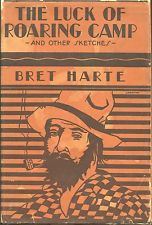
- Posted: 22 noviembre, 2016
- By: Instituto Internacional
- Comments: No Comments
ENGLISH READING CIRCLE – SHORT STORY OF THE MONTH ANALYSIS: “THE LUCK OF ROARING CAMP” BY FRANCIS BRETT HARTE
This month’s story is Francis Brett Harte’s “The Luck of Roaring Camp,” first published in 1868. Harte’s career has been tightly linked to Mark Twain’s, and it’s not hard to see why: they shared a time, place, and an interest in capturing the colloquial reality of provincial America, in particular the realities of the California Gold Rush of the 1840s and 50s. “Roaring Camp,” which is perhaps Harte’s best-known work, certainly falls into this category. However, its notability exceeds simple naturalism.
Harte’s story is deceptively simple: a child is born to a prostitute at a mining-camp and raised by the community of miners there after the mother dies. As the child, named Luck, grows under the care of the men, the camp prospers as well. The story ends in tragedy, though, when a flash flood wrecks the settlement and carries the child and one of his caretakers, the rough and tumble Kentuck, down the stream. They are found together: the baby Luck, now dead, tucked into the arms of the dying Kentuck. The plot as such seems vulnerable to potential melodrama and saccharine overwriting, but Harte’s style maintains the necessary narrative distance to prevent such flaws from developing. The vocabulary and voice are perceptive and somewhat aloof, not overly tender yet far from cold. He strikes a delicate balance in his approach that prevents the pathos from descending into bathos, and that makes the story’s ending, if not totally shocking, at least surprising enough to spark a sincere reaction of grief from the reader. The deaths of Luck and Kentuck are treated with great respect by the narrator; symbolically significant and poetically rendered, something deeply human and precious is revealed here. It is tragic, yet somehow at peace with its own tragedy at the same time.
Beyond the stylistic approaches that distinguish “Roaring Camp”, it is important to call attention to various thematic aspects that provide it with its stature, and further separate it from its contemporaries. One such element is its treatment of Native Americans. As should be clear from the story, Harte was sympathetic to the plight of Native Americans; the boy Luck is referred to as an “Ingin,” and his deep connection to the natural world seems to suggest an alternate system of values to that which guides the inhabitants of the camp. The deaths of Kentuck and Luck could be read as tonally reflective of that system. Another, perhaps even more prominent, theme of Harte’s story is that of gender, and gender’s power as an organizing force in society. Here Harte departs from the conceptualization presented by Twain in “The Californian’s Tale,” which we read last year. Rather than suggest, as Twain seems to do, that bourgeoisie domesticity is a product of femininity, if not of women per se, Luck seems to argue that it is the act of childrearing itself that enforces a kind of morality on any group engaged in it, no matter how rough or uncivilized. While the social arrangement at Roaring Camp is far from natural, the care and love demonstrated by the men for their young charge is, at first, rewarded by nature with better luck than they have seen in some time. The child’s presence obliges a change in habits, in manners, in speech; he has a profound effect on all members of the community, though especially perhaps on Stumpy and Kentuck.
But their luck does not hold. Ultimately nature turns against them in the form of a flood of, we might venture, biblical proportions. One question that we should ask ourselves is how to read this disaster. Is it punishment being enacted by a higher power, by Nature itself, in response to the anti-natural conditions in place at Roaring Camp? Or is it simply a case of their luck changing? We’ll discuss this and other questions next Tuesday afternoon. Happy reading until then.
Andrew Bennett
Search
Categorías
Noticias recientes
-

“We Read Banned Books” en la biblioteca del Instituto Internacional
8 octubre, 2025 -

Nueva edición del Coloquio de la Mujer: mujeres y gastronomía
30 abril, 2025 -

New Edition of the Women’s Colloquium: Women and Gastronomy
30 abril, 2025
